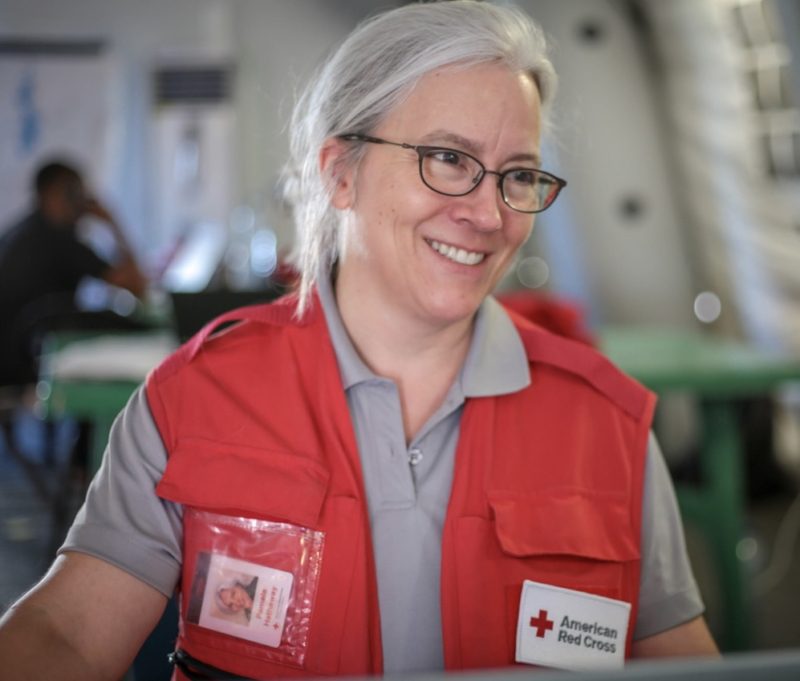Pamela Hathaway spent her time volunteering overseas to help people recover from disasters. When she was diagnosed with an acoustic neuroma, she turned to the surgeons at the USC Caruso Department of Otolaryngology-Head and Neck Surgery for help.
By Geoffrey Waring

Pamela Hathaway is a professional volunteer, using her expertise in GIS to help areas recover after natural disasters.
It happened in the Philippines. Pamela Hathaway, a professional volunteer and GIS expert for the Red Cross, was on another mission providing disaster relief, when suddenly she noticed a strange sensation: it was as though something was blocking her ear canal.
“I was sitting in my hotel one day when my right ear cut out and started ringing,” Hathaway said. “I thought, well that’s bad timing.”
Shortly after returning, the Covid-19 pandemic hit and seeing a doctor became more difficult. When she was finally able to see one, she was presented with an unwelcome diagnosis: an acoustic neuroma—a non-cancerous brain tumor that affects hearing and balance.
Hathaway had an active life as a volunteer, traveling to countries around the world to help in the wake of disasters, and she had also lost people close to her to brain tumors.
“I was so full of anxiety and I realized that I didn’t feel like I could go out on any international disaster assignments because I didn’t know where this thing was going,” Hathaway said. “You can’t go to a Mozambique disaster zone if the nearest MRI is in South Africa. I didn’t feel like I could give them my best.”
While the doctors she was seeing recommended a wait-and-see approach, Hathaway was full of dread and experiencing uncomfortable symptoms. She decided to seek out help. In her research to find a reputable acoustic neuroma program, she found that one of the best in the nation was right in her backyard: the USC Caruso Department of Otolaryngology-Head and Neck Surgery at Keck Medicine of USC.
“In our department, we offer the full range of treatment options for patients with acoustic neuromas, which are more accurately termed vestibular schwannomas,” says department chair John S. Oghalai, MD. “We strive to fully counsel patients about their options and offer them the support they need to make an informed decision about how to proceed. Should surgical removal of the tumor or radiation therapy be chosen, our multi-disciplinary team provides care throughout the treatment and post-treatment recovery phase. We are proud that our outcomes are among the best in the nation.”
Hathaway was introduced to Seiji Shibata, MD, an otolaryngologist at Keck Medicine of USC. Dr. Shibata listened to her concerns and explained her options—but found that Hathaway had already done a great deal of research on treatment and had a solid idea of what she wanted.
Hathaway was prepared to sacrifice her hearing in order to have the tumor removed with minimal brain compression. Then Dr. Shibata told her something she had not found in her extensive research.
“One of the new developments in neurotology is doing simultaneous cochlear implants at the same time,” Dr. Shibata explained. “It turned out to be a good choice.”
Cochlear implants are small electronic devices that bypass damaged parts of the ear and send signals directly to the auditory nerve, which delivers information to the brain. They have been highly successful at providing a sense of sound to people who are otherwise deaf or hard-of-hearing. Simultaneous cochlear implantation with surgery is a relatively new procedure—it has been around for about a decade, and is becoming more common—and something that not every hospital can offer.
“Here at Keck, we are blessed with having a great team of experienced neurosurgeons like Dr. Giannotta (who worked together with Dr. Shibata to perform Hathaway’s surgery as a team) and excellent neurotologists with lots of cochlear implantation experience,” Dr. Shibata said.
This made Keck Medicine of USC a great choice for Hathaway’s treatment.
The results were better than anyone could have expected: not only was the tumor successfully removed, but Hathaway’s hearing actually improved.
“That’s something that simply wouldn’t have been possible with older methods of treatment,” Dr. Shibata said.
Since the surgery, Hathaway’s quality of life has improved immensely. She’s already been able to volunteer internationally again—something she thought she would never be able to do again—and she has regained directional hearing, a full frequency of hearing, and balance. The tinnitus she suffered from also stopped.
“Cochlear implants have been shown to be very powerful at reducing the tinnitus sensation. That was an additional thing that I took into consideration,” Dr. Shibata said. “That seemed to be what she wanted, so we went with that.”
For her part, Hathaway is thrilled with her outcomes.
“My outcome was so great,” Hathaway said. “I can walk in the dark. I have no migraines, no ear pain, no facial nerve problems. I can do the dishes and the laundry now without being nauseous. It’s an improvement all-around.”
Hathway took her first international volunteer trip since the discovery of her acoustic neuroma in May. She is thrilled to be back doing what she loves.
“It was so nice to go back out again and be able-bodied and able to pull my own weight,” Hathway said. “I thought I’d be lucky just to stick around and do local things, and who knows what my new normal would be? But I’m 100% back, I’m flying internationally again, and it’s all good.”
Dr. Shibata noted that while Hathaway’s outcome was notably good, it shows the possibilities of what can happen with high quality of treatment and modern approaches.
“It’s not a guarantee that we’re going to be able to save the auditory nerve, and it’s not something for all patients, but hers is a very good example of what can happen if everything goes well,” Dr. Shibata said. “This is what’s possible, which wasn’t really possible with previous approaches.”
To learn more about acoustic neuroma care at the USC Caruso Department of Otolaryngology-Head and Neck Surgery, click here.